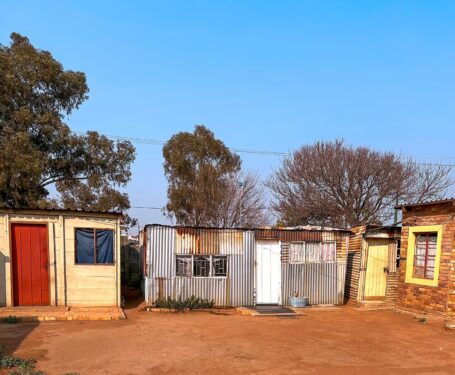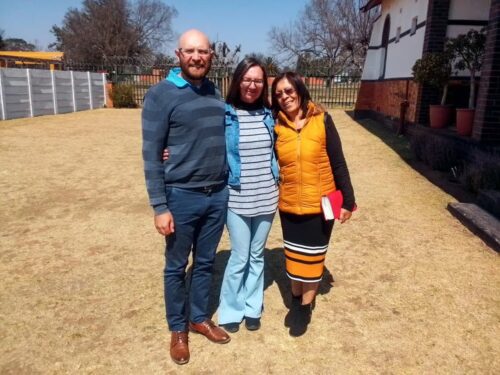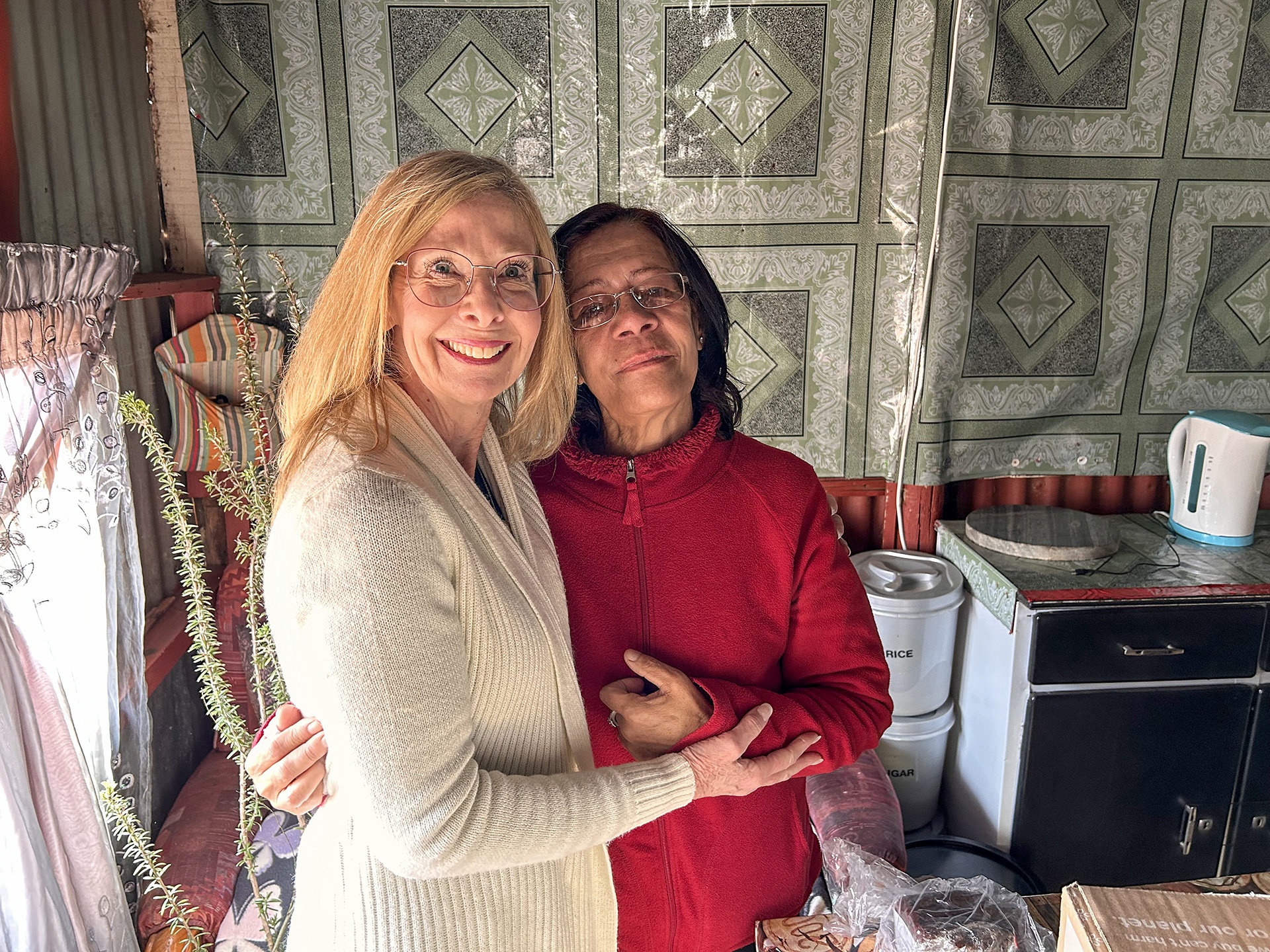On the morning of July 27 at 11:17, a message appeared on Mary’s screen: “It’s hard.”
Mary, a volunteer digital responder in Indiana, read the words and paused. She knew only that the message was in response to the International Mission Board’s digital engagement Olympic ad, “How can we pray for you in Jesus’ name?” But it was also a cry for help.
Sara’s home (pictured) is a 9×9, one-room shack constructed from metal walls. Sara hid here for years, starved for Christian community, before she saw the IMB’s digital engagement ad and sent a message to request prayer. Digital engagement provides a lifeline for believers like Sara, who live in hard places. (IMB Photo)
Prayerfully, Mary typed a message of hope and hit reply. The woman she was communicating with lived halfway across the world, in South Africa.

Sara’s home (pictured) is a 9×9, one-room shack constructed from metal walls. Sara hid here for years, starved for Christian community, before she saw the IMB’s digital engagement ad and sent a message to request prayer. Digital engagement provides a lifeline for believers like Sara who live in hard places. IMB Photo
The next evening at 9:08, Mary got another message, this one more desperate than the first. “My hope is dying. I’m giving up now.”
Sara grew up in an abusive home. Her mother was an alcoholic, and she never knew her father. When she turned 18, she ran away from home and got married. Although Sara had grown up Muslim, she became a faithful follower of Christ after hearing about Jesus. She and her husband served in a church together for many years. Then one day, Sara’s husband informed her he planned to take a second wife, which was customary in their culture. Sara strongly disapproved and begged him not to. But he refused to listen, and she fled in the night. At first, she stayed with her sister. But when Sara’s sister found out she had converted from Islam to Christianity, she kicked her out. That’s how Sara ended up in a shack in the dangerous township extension area of Johannesburg, South Africa.
On July 29, Patti and Doug Irvin, IMB missionaries serving in South Africa, saw a notification pop up on their phones. It was the Olympic digital engagement team in Europe. A woman named Sara had responded to one of the IMB’s digital engagement ads on Facebook. Now Mary, the digital responder, needed to “pass the baton” to someone closer who could help. They wanted to know if Patti and Doug were willing to reach out.
Sara (pictured, far right) meets with the pastor and his wife (pictured, left and center) from Dunnottar Baptist Church near her home. After they visited her, Doug and Patti connected Sara to a local church where she found fellowship and enjoyed worshipping with other believers.
Patti immediately called Sara. On the phone, Sara told Patti she was starving and had not eaten in days. Patti could tell Sara was desperate for connection and felt concerned for her spiritual and physical well-being. She talked to Doug, and they planned to purchase groceries and drive the hour trip to Sara’s home. When Doug noticed a recipe for fruitcake on Sara’s Facebook page, he bought one to include in the groceries.
When they arrived, Sara met them and took them to a 9×9, one-room shack constructed from metal walls. Sara brimmed with joy as she welcomed Doug and Patti to her home. She couldn’t believe they cared enough to visit.
She wept when she discovered the fruitcake in the box of groceries. Patti’s jaw dropped as Sara explained she had prayed for just a taste of fruitcake. During their visit, Sara also shared that she had attempted suicide in the past and failed. Now, she felt grateful to be alive. The Lord heard and answered her prayers.
Patti and Doug continued to encourage Sara over the next several days and helped connect her to a local church.
“We told Sara that believers in Italy, the U.S., South Africa and other countries were praying for her,” Patti said. “This gave her so much hope.”

Sara (pictured, far right) meets with the pastor and his wife (pictured, left and center) from Dunnottar Baptist Church near her home. After they visited her, Doug and Patti connected Sara to a local church where she found fellowship and enjoyed worshipping with other believers. IMB Photo
The ad Sara saw on Facebook is part of a new digital engagement initiative IMB launched during the Paris Summer Olympic Games. The ads ask questions like, “Am I enough?” or “Do you sometimes feel alone?” Ads run on social media platforms and give spiritual seekers the option to talk to a real person, a digital responder whose goal is to share the gospel, discuss Scripture and offer prayer to the person reaching out.
During the Olympics, 8.1 million people saw one of the ads and almost 7,000 people sent messages. More than 500 Gospel conversations took place, and 31 people came to faith in Christ.
“We started this project because we wanted to tap into the global nature of the Olympics. We knew people would physically come, but we knew billions more would be on their devices,” said Brant Bauman, IMB digital engagement strategist for Europe. “We never expected something like this to play out. Only God could have orchestrated this.”
It took many people around the world playing their parts to see a story like Sara’s fully unfold. Now Sara, a believer who spent years in hiding, has purposed to share her story and the hope found in Jesus with other women.
“It’s worth noting that this was really not a small race run by a few, but rather one massive collaborative effort,” Bauman said. “It’s a reminder that we were not called to isolation but rather into a unified body of believers.”
Like Mary, a former IMB missionary to Peru now living in Indiana, who signed up to be a volunteer digital responder after reading a missionary’s prayer letter and was Sara’s first contact.
Like Doug and Patti, IMB missionaries serving in South Africa, who visited Sara in person.
Like hundreds of others who signed up to cover the initiative in prayer for 30 days or who generously gave financially to make the digital ads possible.
“We can all fulfill the Great Commission to go, whether that is logging on to a computer and responding to a message, praying, calling, texting, meeting up, taking food or getting someone connected to a local church,” Bauman said.
The IMB is excited to see how digital engagement continues to create new opportunities for gospel access and to engage people in their spiritual journeys.
“There are so many more ‘Saras’ out there that need our prayer,” Bauman said. “And there are exponentially more people out there that will never have gospel access unless we go to the digital mission field.”
Watch this video or click here to learn more about digital engagement and the digital mission field.
Some names have been changed for security.

